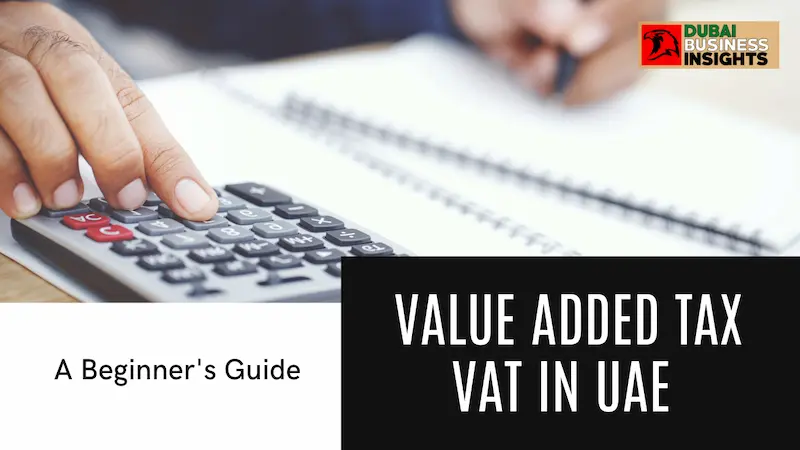Value Added Tax VAT in UAE: VAT is a common term for many people around the world, but understanding its intricacies, especially in the context of the United Arab Emirates (UAE), can be a bit overwhelming for beginners. In this article, we’ll take you on a journey through VAT in the UAE, breaking it down into simple terms and providing real-world examples to help you grasp the concept. Let’s get started.
What is VAT?
VAT, or Value Added Tax, is a consumption tax levied on the value added to goods and services at each stage of the supply chain. This means that every time a product or service changes hands, a small tax is added based on the value added.
Why VAT in UAE?
VAT was introduced in the UAE on January 1, 2018, to diversify the country’s revenue sources and reduce its reliance on oil-related income. It also helps fund public services like healthcare, education, and infrastructure development.
How Does VAT Work in UAE?

Here’s a simplified example:
- A bakery makes bread and sells it to a supermarket for AED 10.
- The bakery charges a VAT of 5%, which amounts to AED 0.50.
- The supermarket then sells the bread to you for AED 12, including VAT.
In this scenario, the supermarket collected AED 0.50 in VAT from the customer, which it will later pass on to the government. The bakery also paid AED 0.50 in VAT to the government. The total VAT remains AED 1, but it’s distributed between the different stages of the supply chain.
VAT Rates in UAE
- Standard Rate: Most goods and services are subject to the standard VAT rate of 5%.
- Zero Rate: Some goods and services, like exports, international transportation, and certain healthcare services, are taxed at 0%.
- Exempt: There are items, such as residential properties and some financial services, that are exempt from VAT.
- Deemed Supply: This applies when a business owner uses their goods or services for non-business purposes. VAT may be due based on the market value of such supplies.
Registering for VAT
Businesses in the UAE that earn over a certain threshold must register for VAT. This ensures they collect and pay VAT correctly. If a business earns less than the threshold, it can choose to register voluntarily.
VAT Returns
Regularly, registered businesses must file VAT returns with the Federal Tax Authority (FTA). They report the VAT they collected and paid. If they’ve collected more VAT than they’ve paid, they must remit the difference to the FTA.
Impact on Individuals
As a consumer, you will see VAT on most goods and services you purchase. It’s essential to understand how VAT affects your daily life to budget effectively.
Common Misconceptions

- VAT on Basic Necessities: In the UAE, essential items like basic groceries and healthcare services are usually exempt from VAT.
- VAT on Rent: Residential property rentals are generally exempt from VAT.
Conclusion
VAT is an integral part of the UAE’s economy. While it might seem complex at first, the key is to understand the basics. Always ask for a VAT receipt when you make a purchase and be aware of what you’re being charged. As you navigate daily life in the UAE, VAT will become a more familiar concept, making it easier to manage your finances effectively.
Remember, this article provides a simplified introduction to VAT in the UAE. If you’re a business owner, it’s advisable to consult with a tax professional to ensure compliance with all regulations and requirements.
Value added Tax VAT in UAE
FAQ
Q1: What is VAT, and why do I need to know about it in the UAE?
Answer: VAT, or Value Added Tax, is a small percentage added to the cost of most things you buy. It’s important in the UAE because it helps the government provide public services like schools and hospitals. So, understanding VAT is crucial for everyday shopping.
Q2: When do I need to pay VAT, and how much is it?
Answer: You pay VAT when you buy things, like clothes or electronics. It’s usually 5% of the item’s price. But some things, like basic groceries and certain services, are exempt from VAT, so you don’t pay for those.
Q3: Do I need to register for VAT as an individual?
Answer: No, individuals typically don’t need to register for VAT. It’s businesses, especially those with earnings over a certain amount, that need to register and manage VAT for the government.
Q4: What happens if a business doesn’t follow VAT rules in the UAE?
Answer: If a business doesn’t follow VAT rules, they might face penalties. These rules are in place to ensure that businesses charge the right amount of VAT and pass it on to the government.
Q5: Can I get any benefits from VAT?
Answer: If you’re a business and you follow VAT rules, you can often reclaim the VAT you’ve paid on your expenses. This can help reduce your costs. And for everyone, VAT helps fund public services that benefit the whole community. So, in a way, we all benefit from VAT.

